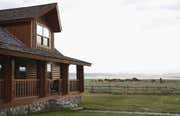Even if you’ve enjoyed your vacation home for years, there may come a time when you’re ready to sell – for personal and/or financial reasons. Because there are tax implications, planning ahead and good record keeping are two practices that can help you limit potentially costly errors when it comes time to sell your vacation home. Pay special attention to the tax rules for capital gains and 1031 exchanges.
Capital Gains
To claim the capital gains exemption, you must make the vacation property a primary residence for at least two years – otherwise, you’ll owe taxes on any profit from the sale. Essentially, the sale is treated the same way as if you sold stock. If you owned the home for more than 18 months, the profit is considered a long-term capital gain, and if you owned it for less than 18 months, it’s considered a short-term gain.
Certain expenses can be added to your cost basis when determining capital gains – including the money you spent on improvements. It’s important to keep excellent records of the expenses associated with the home – doing so can save you a lot of money. (For related reading, see: Avoid Capital Gains Tax on Your Home Sale.)
1031 Exchanges
A 1031 exchange, also known as a like-kind exchange or tax-deferred exchange, is a transaction where a seller swaps a rental or investment property for another rental or investment property of equal or greater value, on a tax-deferred basis. The advantage is that you may be able to avoid paying capital gains tax on the exchange. A property must be considered a rental property (and not a personal residence) to qualify for a 1031 exchange – which means you must rent out the property for 15 days or more and use it for less than 14 days or 10% of days the home was rented. (See also: 10 Things to Know About 1031 Exchanges.) Note that these exchanges were preserved for real estate (not, for example, artworks) in the 2017 tax legislation.
Rental Potential
If your vacation home has been used as a rental, a solid rental history can really boost the home's value and marketability. Again, it pays to keep accurate records. Many real estate markets are flooded with vacation properties. The homes may be comparable and offer similar amenities, but the one with a strong rental history will likely sell for more money. (For more, see: How to Prevent a Tax Hit When Selling a Rental Property.)
Vacation Property Walkthrough: Conclusion
-
 Taxes
TaxesHow to Prevent a Tax Hit When Selling a Rental Property
Rental property ownership has its benefits, but when selling you can face a big tax hit. Thankfully, there are ways to reduce your capital gains exposure. -
 Taxes
TaxesTax Breaks for Second-Home Owners
Owning a second home is a great investment for a variety of reasons, but you need to know the tax implications of multi-home ownership. -
 Managing Wealth
Managing WealthEconomics of Owning a Vacation Home
Discover the financial factors behind owning a second home and how weighing your options can determine if a vacation home is right for you. -
 Taxes
Taxes10 Things to Know About 1031 Exchanges
Real estate swaps grow popular, but traps are many. Here's 10 things to know when considering 1031 swaps. Also: Beware new rules on vacation homes. -
 Investing
InvestingVacation Home or Income-Producing Investment?
Rather than let your vacation home sit empty, you can rent it out and make a profit. But you'll need to consider the tax implications. -
 Financial Advisor
Financial AdvisorHow to Reduce Real Estate Investment Taxes
Real estate tax law is not the same for rental properties as it is for residences. These tips can help you pay less in taxes. -
 Investing
InvestingInvesting in Rental Property: What to Consider
Investing in rental property has some unique issues which need to be considered. -
 Investing
InvestingStrategies To Buy The Perfect Vacation Home
Ask yourself these six questions to make the right decision about a vacation property. -
 Investing
InvestingIs It Worth Buying a Second Home to Rent?
Consider these dos and don'ts before making the leap into rental property ownership.



